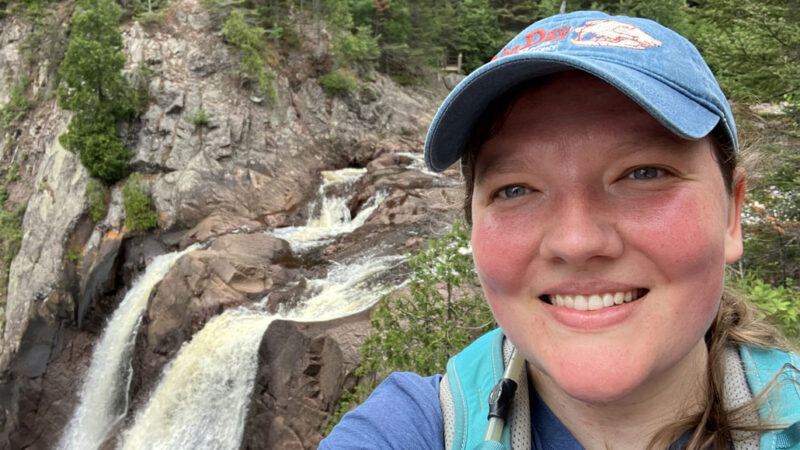Like most little kids, Anne Kort was fascinated by dinosaurs. But by high school, she had become interested in other kinds of prehistoric life. “I just wanted to learn about everything that wasn’t a dinosaur,” says Kort. “I like all the weird things.”
She found one weird thing while working on her master’s degree. She was studying fossils from an extinct mammal called Patriofelis ulta. This catlike carnivore stalked the U.S. West roughly 50 million years ago. CT scans revealed something special about the beast’s vertebrae.
The backbones of animals have special protrusions that help the pieces fit together. Called articulations, they help keep the spine stable. The vertebrae of Patriofelis, though, didn’t look like those of today’s mammals. They had interlocking parts that “fit together like a lock and key,” says Kort.
Now a vertebrate paleontologist at the University of Michigan in Ann Arbor, Kort uses computers to study how mammals evolved to move. Studying fossils virtually allows Kort to examine specimens in ways that are impossible by hand. She even makes YouTube videos teaching others how to study fossils using 3-D software available to the public. In this interview, she shares her experiences and advice with Science News Explores. (This interview has been edited for content and readability.)
What inspired you to pursue your career?
In college, I wanted to do science but not physics or chemistry. Earth science sounded cool, so I decided to do it. I thought it was about trees, rocks and water. But it is just geology in disguise. I still ended up loving it.
During my junior and senior years, I ended up working on CT scans of modern rodent jaws. We were trying to identify similar-looking species from just their jaw bones. We could then go back and identify those same species in the fossil record. That let us track how their ranges changed during the Ice Ages. That’s how I got started with 3-D data and paleontology. I wasn’t that interested in the rodent jaws, specifically, but I loved everything else about the research.
What was one of your biggest setbacks and how did you get past that?
A good example of me screwing up was my attempts to apply to grad school. I started applying senior year of undergrad and didn’t finish because I got so overwhelmed. It was pretty brutal. After taking a gap year, I applied to six schools. I got outright rejected from three, interviewed and then got rejections from another two and didn’t hear from the last for months. I was pretty confident that I wasn’t going to get into the last, Indiana University Bloomington. And it felt like I wasn’t ever going to attend grad school. I took it very hard. Reflecting back on it, it wasn’t as big of a deal as it felt because I could’ve always applied during another cycle if I didn’t get in.
I think there’s kind of an unfortunate perception that you must always have this perfect chain of successes. Otherwise, you’re going to fall out of a very competitive field. I see why people think that. But I’ve definitely met successful people who didn’t have this perfect chain of successes. Success is based on chance and opportunity, to some extent. But it’s also based on the ability to deal with setbacks when they inevitably happen. And I suspect there’s very few people who have literally never had any sort of setback.
Anne Kort shows off her Ph.D. work using 3-D virtual models of fossils.
What do you do in your spare time?
I play an embarrassing amount of video games. Which, funny enough, is an interest connected with the 3-D scanning and virtual paleontology stuff. I’ve been playing Animal Crossing every morning for, like, half an hour before I start getting ready. I sit in my armchair with my cat on my lap and I have my coffee. I also play MMOs [massively multiplayer online video games] and other games with my husband. And I like going to natural history and art museums when I can.
What piece of advice do you wish you had been given when you were younger?
I wish I had been told that networking is just making friends with people who have the same interests as you. It is very important, and you cannot downplay the importance of it. Those connections that I built up over time really are why I’m where I am. But it does not have to be this scary thing. You don’t have to think of it as taking things from people.
I’d also say don’t fixate on getting one specific job in a specific field. If you have a very specific dream as a kid, you know just a fraction of a fraction of the possibilities that exist. It’s possible that really cool jobs don’t even exist yet. Be willing to experiment with your interests and don’t tie yourself to your childhood dream.
There might be something that sounds really boring on paper like geology. But by trying it out, you’ll see there are a lot of really interesting things to it that you never would have known about. Sometimes those experiments fail, and that’s fine. If I had to choose between taking a non-paleontology job I enjoy and a paleontology job where I’m miserably overworked, I’m picking the first option.




